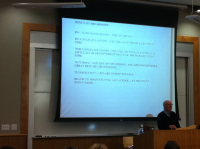
Rimer v. State (Nev. Supreme Ct. – June 11, 2015)
The issue is whether the Nevada Legislature intended for child abuse and neglect to be treated as a continuing offense and therefore the statute of limitations does not begin to run until the last act of abuse or neglect is completed.
Stanley and Colleen Rimer had eight children: Jason, Spencer, Enoch, Quaylyn, Aaron, Crystal, Brandon, and Stanley, III. Their youngest child, Jason, was born on March 11, 2004, and was found dead on June 9, 2008. At the time of Jason’s death, Spencer was 9, Enoch was 11, Quaylyn was 14, Aaron was 15, and Crystal was 17 years old, and Brandon and Stanley were adults.
Jason was born with congenital myotonic dystrophy, a chronic condition that affected his muscles and made it difficult for him to breathe, swallow, talk, and walk. Even at four years old, he walked like a baby, required diapers, and communicated mostly by fussing or screaming. He was treated by a neurologist, a gastroenterologist, a cardiologist, an orthopedist, a speech pathologist, a physical therapist, and a nutritionist. For a while, he was fed through a gastrostomy tube (G-tube) that was inserted through his abdomen so that food could be delivered directly to his stomach. He was happy and liked to play with other children.
During Jason’s lifetime, the Rimer home was frequently cluttered: the kitchen and bathrooms went days without being cleaned, the kitchen sink was often filled with dirty dishes, and the laundry room and bedrooms were normally piled with dirty clothing. There were also occasions where dog and bird excrement dirtied the carpet and remained there for days without being removed. Although the Rimers routinely hired housekeepers and carpet cleaners, the house and its carpets quickly became dirty again.
The clutter increased with the decline of Rimer’s construction business and the financial slump that followed. Rimer closed his office and vacated his storage units and moved their contents into the house. The presence of construction tools and paint buckets in the house created obvious safety hazards. Although the Rimer family tried to reduce some of the clutter and generate revenue through yard sales, the house was extremely cluttered at the time of Jason’s death: the household furniture had been moved or stacked for carpet cleaning, the kitchen sink was full of dirty dishes, and the fish tanks were green with algae.
The Rimer family continuously struggled with lice. The children were often sent home from school because they had head lice. Usually, they were treated with a lice-killing shampoo and sent back to school, where they were inspected by a nurse before being allowed back in the classroom. For a while, the children’s grandmother contributed to this recurring problem by refusing to be treated for lice. There also came a time when the lice-killing shampoo was no longer strong enough to kill the lice, but Rimer was able to find a product online that solved the problem.
The Rimer family did not go hungry. They had refrigerators downstairs in the kitchen and upstairs in the master bedroom. And there were also cases of food in the garage and pallets of food in the living room. They had frozen, refrigerated, canned, and dried food. The children routinely ate food that required little preparation or cooking, and when that sort of food ran out, they went upstairs and asked their parents for more. There was always food downstairs, but sometimes it was only the sort of food that required cooking and no one wanted to cook. Colleen did most of the cooking for the family. On one or two occasions, Quaylyn was punished by receiving only bread and water.
Rimer had a tiered approach to disciplining his children. First, he would place his children in a timeout by requiring them to stand in a corner for 5 to 30 minutes, then he would take away their videogame privileges, and finally he would spank them. But if a timeout was not severe enough for the level of misbehavior, the child might be sent to bed without dinner, and if the child’s misbehavior involved fighting, the initial punishment might be a spanking.
Rimer spanked his children on their behinds with boat paddles, paint sticks, belts, and his bare hands. The number of spanks in a spanking could range from 1 to 50. Rimer had two wooden boat paddles: one was three to four feet long and the other was two to three feet long. He purchased the second paddle to replace the first paddle and drew shark’s teeth on it with a permanent-ink marker. He broke both paddles while spanking his children and repaired them with duct tape. Rimer explained to his children what they did wrong and why they were getting spanked before he spanked them.









